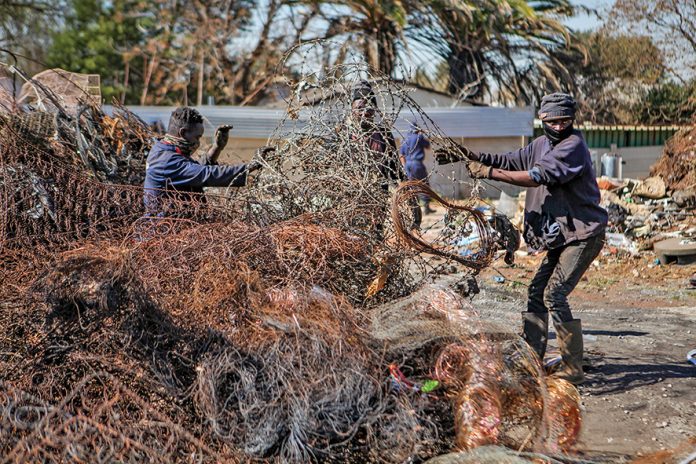The theft of metal and scrap metal has intensified following a sharp rise in global demand in 2021/2022, according to the Department of Trade, Industry, and Competition.
Addressing the portfolio committee on trade, industry and competition on Tuesday, the department said the widespread theft of metal and infrastructure is driven by high demand for copper and other forms of scrap metal, mainly for the export market.
It said the country has about 25 000km of railway lines, noting that the Passenger Rail Agency of South Africa owns 2 280km of that portion, exclusively in Gauteng, eThekwini and Cape Town. Transnet operates the remainder.
“A multi-billion industry has flourished. Legally collected scrap metal and scrap stolen from public and private infrastructure are sold to recycling firms who supply both the domestic industry [foundries and steel mini-mills] and export markets,” said the department.
“The length of cable stolen from Transnet’s lines rose sixfold from 2017 to 2021. The amount of cable stolen from Transnet climbed from 120km to 724km over this period.
“In 2021, more than 200km of railway tracks were stolen in November alone. In August 2022, Transnet reported an impact of R4.1-billion due to cable theft, large-scale theft of copper cables used for electricity transmission and distribution over many years. In 2020/2021, the damage from stolen steel lattices was estimated at R100-million.”
According to the department, Eskom’s network comprises 33 158km of transmission and 391 784km of distribution lines’ “total of 424 942km network made of copper, aluminium and steel”.
It said the theft of copper cables, railway tracks, and other metals negatively affects power supplies and freight rail services, leading to Eskom and Transnet being unable to operate at full capacity.
“Joburg City Power reported 285 theft cases between August 2020 and April 2021. Infrastructure theft resulted in an estimated loss of R36 658 572. About R85-million per annum is spent on additional security personnel, security infrastructure [such as booms, alarms, beams, drones, fencing, CCTV cameras, intelligence gathering and/or security operations],” said the department.
On August 9, the government proposed a six-month ban in published policy proposal for public comment on measures to address metal theft in an attempt to combat widespread theft and vandalism of public infrastructure.
At the time, the department said the economic cost of copper theft alone was estimated to be more than R45-billion annually.
“The theft of scrap metal and copper cables from public infrastructure hinders the performance of the economy by imposing enormous costs. Some of the disruptions include the supply of energy and rail services due to vandalised rail tracks.
“They impose additional transport costs on commuters due to disrupted commuter transport. Vandalised and unsecured electricity cables pose safety risks to communities, especially children.
“Cabinet directed that the department should lead the consultations within a limited period, and solicit inputs from the public and relevant sectors on effective measures that government can implement to stop the vandalising of critical economic infrastructure. Thereafter, cabinet will pronounce on the approved measures.”
The public was given 21 days to give input on the three phases proposal. The department said the six-month ban falls under phase one.
“Phase two will see the introduction of a permit system and phase three being the potential amendments to legislation which will, amongst others, see the blacklisting of scrap metal offenders.
“This move also forms part of commitments by President Cyril Ramaphosa in his 2022 SONA [State of the Nation Address] on decisive steps that will be taken in the country to address damage to infrastructure and the negative impact on the country’s economy.”
Follow @SundayWorldZA on Twitter and @sundayworldza on Instagram, or like our Facebook Page, Sunday World, by clicking here for the latest breaking news in South Africa. To Subscribe to Sunday World, click here.




